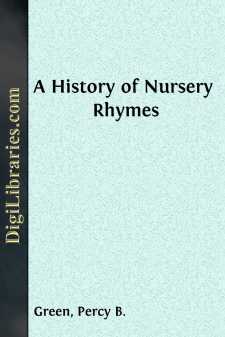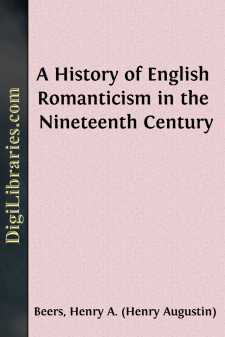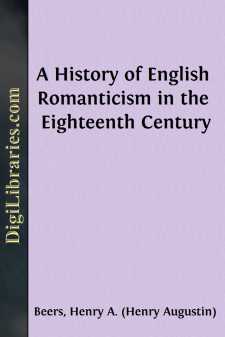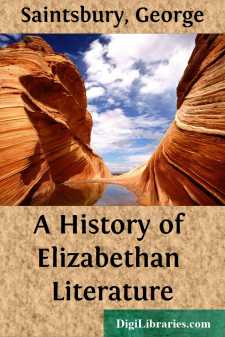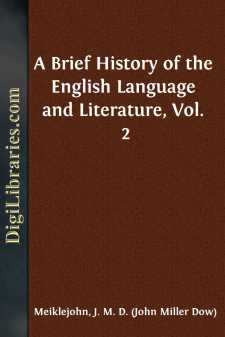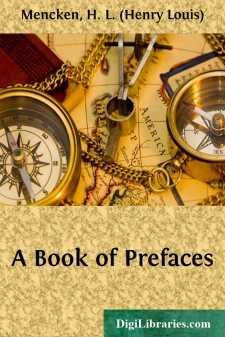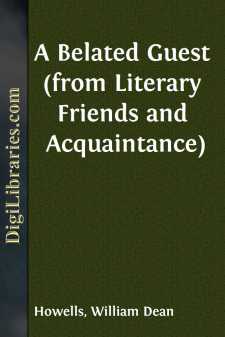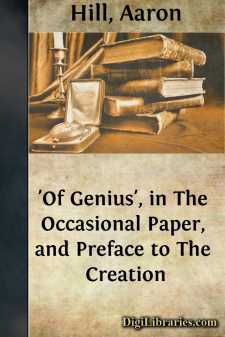Literary Criticism
- American 18
- Ancient and Classical 3
- Asian 1
- Australian & Oceanian 1
- Books & Reading 8
- Caribbean & Latin American 2
- Drama 2
- English, Irish, Scottish, Welsh 49
- European 7
- General 37
- Horror 1
- Humor 2
- Jewish 2
- Medieval 2
- Middle Eastern 3
- Poetry 7
- Renaissance 6
- Russian & Former Soviet Union 1
- Shakespeare 27
Literary Criticism Books
Sort by:
by:
Percy B. Green
CHAPTER I. "The scene was savage, but the scene was new." Scientists tell us many marvellous tales, none the less true because marvellous, about the prehistoric past. Like the owl in the preface, they are not discouraged because the starting-point is beyond reach; and we, like the cat, should try to awaken our interest when evidences are presented to us that on first hearing sound like the...
more...
CHAPTER I. Walter Scott.[1] It was reserved for Walter Scott, "the Ariosto of the North," "the historiographer royal of feudalism," to accomplish the task which his eighteenth-century forerunners had essayed in vain. He possessed the true enchanter's wand, the historic imagination. With this in his hand, he raised the dead past to life, made it once more conceivable, made it even...
more...
CHAPTER I. The Subject Defined To attempt at the outset a rigid definition of the word romanticism would be to anticipate the substance of this volume. To furnish an answer to the question—What is, or was, romanticism? or, at least, What is, or was English romanticism?—is one of my main purposes herein, and the reader will be invited to examine a good many literary documents, and to do a certain...
more...
As was explained in the Note to the Preface of the previous editions and impressions of this book, after the first, hardly one of them appeared without careful revision, and the insertion of a more or less considerable number of additions and corrections. I found, indeed, few errors of a kind that need have seemed serious except to Momus or Zoilus. But in the enormous number of statements of fact which...
more...
by:
Henry Jenner
PREFACE This book is principally intended for those persons of Cornish nationality who wish to acquire some knowledge of their ancient tongue, and to read, write, and perhaps even to speak it. Its aim is to represent in an intelligible form the Cornish of the later period, and since it is addressed to the general Cornish public rather than to the skilled philologist, much has been left unsaid that...
more...
INTRODUCTION. 1. Tongue, Speech, Language.—We speak of the “English tongue” or of the “French language”; and we say of two nations that they “do not understand each other’s speech.” The existence of these three words—speech, tongue, language—proves to us that a language is something spoken,—that it is a number of sounds; and that the writing or printing of it upon paper is a quite...
more...
JOSEPH CONRAD "Under all his stories there ebbs and flows a kind of tempered melancholy, a sense of seeking and not finding...." I take the words from a little book on Joseph Conrad by Wilson Follett, privately printed, and now, I believe, out of print. They define both the mood of the stories as works of art and their burden and direction as criticisms of life. Like Dreiser, Conrad is forever...
more...
My recollections of Bret Harte begin with the arrest, on the Atlantic shore, of that progress of his from the Pacific Slope, which, in the simple days of 1871, was like the progress of a prince, in the universal attention and interest which met and followed it. He was indeed a prince, a fairy prince in whom every lover of his novel and enchanting art felt a patriotic property, for his promise and...
more...
by:
Aaron Hill
INTRODUCTION The anonymous essay "Of Genius," which appeared in the Occasional Paper of 1719, still considers "genius" largely a matter of aptitude or talent, and applies the term to the "mechanick" as well as the fine arts. The work is, in fact, essentially a pamphlet on education. The author's main concern is training, and study, and conscious endeavor. Naturally enough,...
more...


